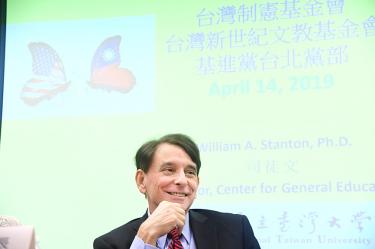Cross-strait unification is not in the US’ interests and the US government should make it clear that it would not support unification unless Taiwanese welcomed such a change after China becomes democratic, Former American Institute in Taiwan director William Stanton said yesterday.
Stanton made the remarks during his keynote speech at a conference held by the Taiwan New Constitution Foundation to mark the 40th anniversary of the Taiwan Relations Act (TRA).
He gave an overview of the Three Joint Communiques between the US and China, saying that the US signed them based on expectations that were later proved to be “totally wrong.”
The expectations included that the US would be able to build a long-term relationship with China that would result in mutually beneficial cooperation on political, economic and strategic matters, and that Taiwan, then under the autocratic leadership of Chiang Kai-shek (蔣介石), would soon become part of greater China, he said.
The communiques are “relics of the Cold War” and are “factually inaccurate,” he said.
For example, the 1972 Shanghai Communique’s central claim — that the US acknowledges that people on both sides of the Taiwan Strait maintain there is but “one China” and that “Taiwan is a part of China” — “has no factual basis,” he said.
While that might be true to Mao Zedong (毛澤東) and Chiang, nobody asked the people on either side of the Strait, he said.
The second communique, signed in 1979, states in a similarly fuzzy manner that the US acknowledges the Chinese position that there is but “one China” and that “Taiwan is a part of China,” he said.
“I may acknowledge that you think I am crazy, but that does not mean I agree with you,” he said.
However, “if the first two communiques are flawed, the third communique is just totally wrong,” he said.
While the communique signed in 1982 states that the US would gradually reduce arms sales to Taiwan, it never did, he said.
Then-US president Ronald Reagan was unhappy with the communique and partly as a result fired then-US secretary of state Alexander Haig and agreed to the “six assurances,” Stanton said.
The US’ policy on and agreements with Taiwan are complex, he said, adding that they cannot be neatly summed up by Beijing’s “one China” principle.
As the US seeks to maintain non-official relations with Taiwan, it has imposed on itself a number of restrictions, but there are simple measures that it could adopt to improve relations, he said.
For example, it could avoid referencing the term “one China” and the Three Joint Communiques, while referring to the TRA and the “six assurances” more often, he said.
It should also adjust a policy then-US president Bill Clinton announced in 1998 that the US would not support the admission of Taiwan into any organization where statehood is required, he said, adding that it contravenes the TRA.
It should also strengthen cooperation with Taiwan in regional security and trade, he said.
The US has become more realistic about what China is and has more understanding of Taiwan’s importance, he said.
He would like to see “a clear statement” from the US that it does not support unification “unless and until China becomes a free and democratic country where the rule of the law and respect for human rights are fundamental principles” and that Taiwanese welcome unification, he said.
“A secure and democratic Taiwan is just as critical as peaceful cross-strait relations for a stable and secure Asia,” he added.
Source: Taipei Times - 2019/04/15





















